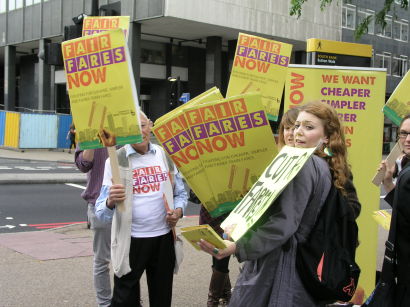FARES on National Rail are to rise by an average of 8 per cent in England next January, following yesterday's announcement of the RPI in July, which decides the change. The government says the additional revenue is essential for railway investment and to reduce subsidies from taxpayers, but pressure groups are describing the increase as 'punitive'.
Protestors from pressure groups and unions staged a demonstration at Waterloo (pictured) just before July's RPI of 5 per cent was announced. They were accompanied by another group, Bring Back British Rail, which is calling for general renationalisation of the railways.
The Campaign for Better Transport has launched a petition opposing the rise of RPI + 3 per cent in England, which will apply for the next three years. The Scottish increase stays at the previous formula of RPI + 1 per cent, and no decision has yet been taken about increases for journeys wholly within Wales.
Some regulated fares in England could rise by as much as 13 per cent, because the government has restored the fares 'flex', which allows operators to impose greater increases for specific journeys so long as other fares are adjusted to maintain the average.
The Campaign's chief executive Stephen Joseph told Railnews: "Clearly, some of the investment in the railways should come from farepayers, and I don't think they would object if they were seeing real investment.
"What we are seeing, though, are very large rises which will feed back into government coffers. They won't necessarily go to investment. We think the real answer is the reductions in costs that McNulty started to talk about, and also other sources of revenue. Other countries use property taxes, and we've seen Crossrail partly financed by that. We want to see that kind of experience looked at more generally."
The unions are also opposing the increases, with Bob Crow of the RMT describing privatisation as 'robbery'.
The RMT has published new research which claims that privatisation has 'bled' £6.6 billion out of the industry since 1997 - with a forecast that a further £6.7 billion would also be paid to shareholders in the next ten years.
The union commissioned the research from Just Economics, which calculated that profits and fragmentation costs were £883 million in 2009 alone, and more than £6.6 billion between 1997 and 2009.
Mr Crow added: "RMT calculate that this would equate to an annual 10 per cent cut in rail fares or free bus and rail travel for all children under the age of 16. Instead, McNulty and the government are forcing through inflation busting fare increases and savage cuts to maximise private train company profits. The whole policy of rail privatisation is exposed as an economic and social disaster.”
However, the Association of Train Operating Companies said the decision had been a matter for the government. David Mapp, who is commercial director at ATOC, said: “We know that these are difficult financial times for many people. The government has decided that many fares need to rise above inflation for the next three years to help pay for more trains, better stations and faster services.
"Increasing the money raised from fares will mean that taxpayers contribute less to the running of the railways, whilst ensuring that vital investment can continue. All additional money raised through the change to RPI+3 will go straight back to the government.
"The industry is working with the Government to cut the cost of running the railways, building on the progress that has already been made. A more efficient railway will help to limit fare rises in the future."


